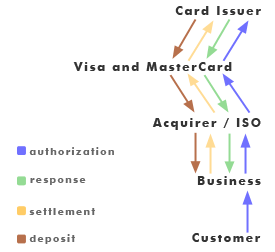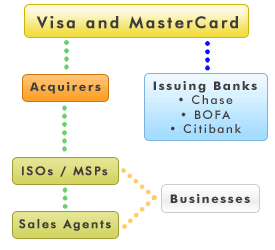Merchant Services Industry in a Nutshell
From a business standpoint, the merchant service industry is a seemingly simple service based industry where business owners pay for processing services through a company that is established to represent Visa and MasterCard. In reality, there are multiple tiers of businesses operating to keep the credit card processing services and networks working and efficient and an even more complex network that makes up the back-end, and the sales forces of the processing industry.
How Credit Cards are Processed and Interchange is Collected

When a card is accepted by a business, a number of steps must take place for that money to be transferred into the business's bank account. This can vary between card types, credit, debit, charge, etc., but generally the steps that take place are as follows. First the card information is captured from the credit card. This can be done manually, by a computer, website, POS system, or a standalone terminal with a magnetic card reader. The device then sends the card data along with information about the business that is processing the card and information about the specific transaction, to that business's acquirer (The company that supports the business's merchant account.) The acquirer then sends that information to the card issuer (Visa or MasterCard) who checks the specific card issuing bank (Chase, Citibank, Bank of America, etc.) to see if there is enough available credit on the account. If the funds are available, the card issuer holds those funds for the business that accepted the card. The card issuer then sends the approved, declined or error response back to the acquirer, who then forwards it back to the business. At this point, the transaction is considered complete from the customer's standpoint.
At the end of the day, a business makes a settlement request to their acquirer who then sends that request to Visa and MasterCard, who then send it to the card issuing banks who's card holders made purchases at that business. The card issuing bank then deducts the money from the card holder, and pays the acquirer, who then pays the business. During this process, the fees that a business pays to process that credit card are collected. The card issuer receives the majority of these fees, called interchange, and the acquirer gets the remaining amount after interchange is paid. This remaining amount is split between the acquirer and the merchant service provider who the business signed up with. Acquirers also have their own fees, some mandated by Visa and MasterCard that make up the remainder of the bill for a business.
Where Merchant Service Providers Fit In

Merchant service providers, called ISOs or MSPs, are companies that sell merchant services directly to businesses. Essentially, they are the link between a business and the acquirer. These companies sell services for one or more Acquirers, and must be registered with Visa and MasterCard to legally provide merchant services in their own name. Providers can be public or private companies, banks, and virtually any other type of organization that has the means to register with an acquirer and Visa and MasterCard. Since an ISO has access to specific card and transaction information which requires a great deal of security and trust from Visa and MasterCard, the registration process is very thorough and expensive. Usually, a company must be well established to become a Visa and MasterCard ISO.
ISOs greatly vary in size and the model in which they conduct their business. The largest ISOs typically service smaller ISOs who directly serve businesses. Some ISOs have thousands of employees, while other only have a handful. Some ISOs provide 100% of the support their customers require while others provide none. ISOs are as unique to each other as businesses are to each other. ISOs can sell services directly to business owners, and they often employ an outside sales force.
Outside sales agents are the largest sales force of the merchant services industry. These are independent people and companies that work for one or more ISOs and are typically paid residual income based on the fees their customers pay, per-account commission, or a combination of the two. Some outside sales agents provide most of the support for their customers, while others defer support to the ISO that they represent. The amount of support an outside sales agent provides, depends largely on their size and experience.
Choose Your Provider Wisely
Despite the fact the ISOs go through a rigorous process to establish themselves, not all of them are good companies. Many exist to rip off business owners who do not know enough to protect themselves. Many ISOs provide very poor services that can hurt a business's ability to grow or remain in business. Banks are no exception to this, and them being a solution to bad ISOs is one of the largest misconceptions of the processing industry. These bad ISOs have helped build a negative reputation for much of the processing industry, but there are good companies that truly want to help their customers.
Choosing a merchant service provider should not be a light task. Time in research should be taken before ever agreeing with a company. New businesses should start the research process months before opening, and take the steps to get setup about four weeks before opening. It is a bad place to be if a business is opening in two days and the owner just started looking for a merchant service company. Business owners are placing their revenue and success in the hands of a single company, so make a good one is chosen.


